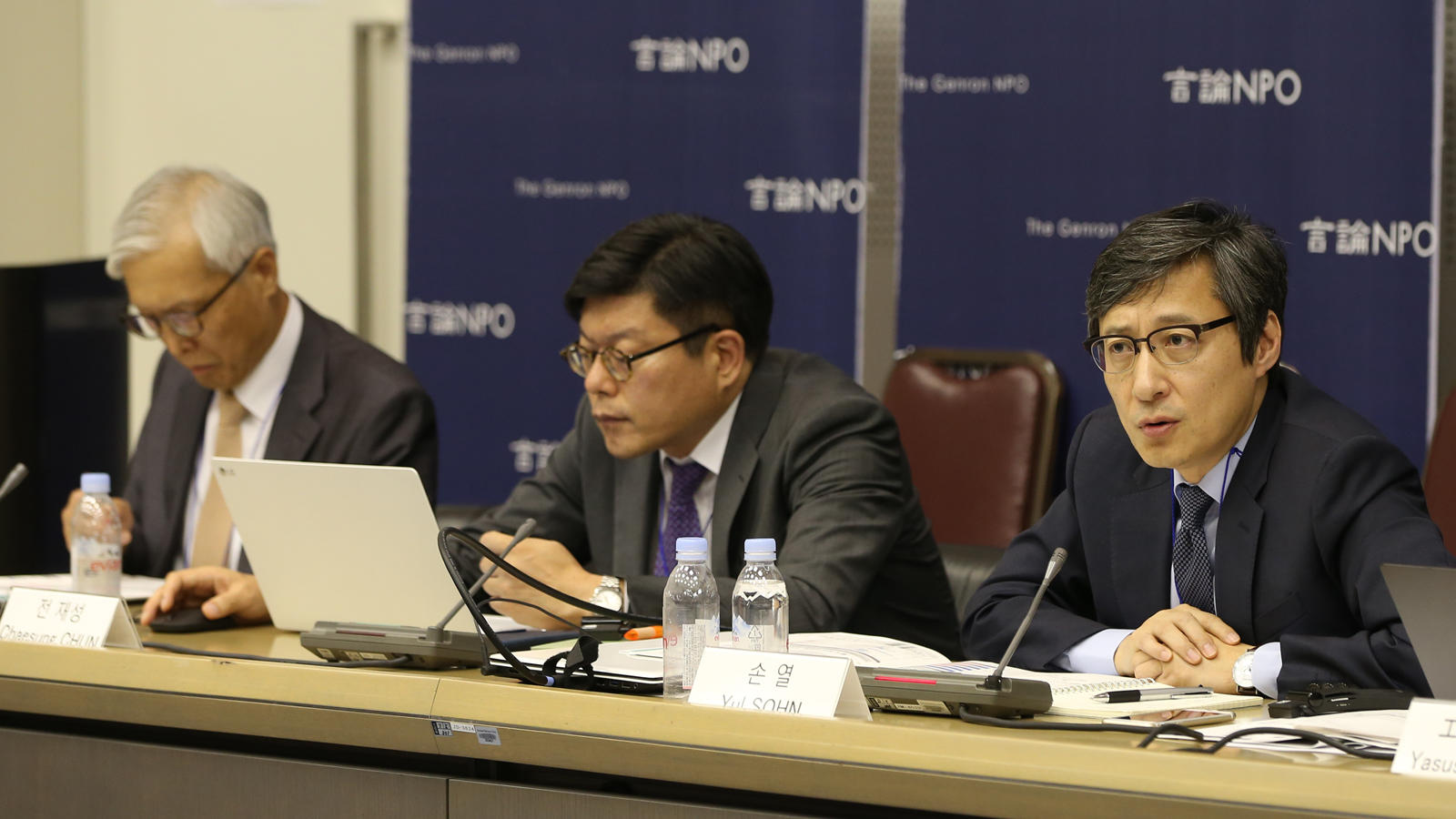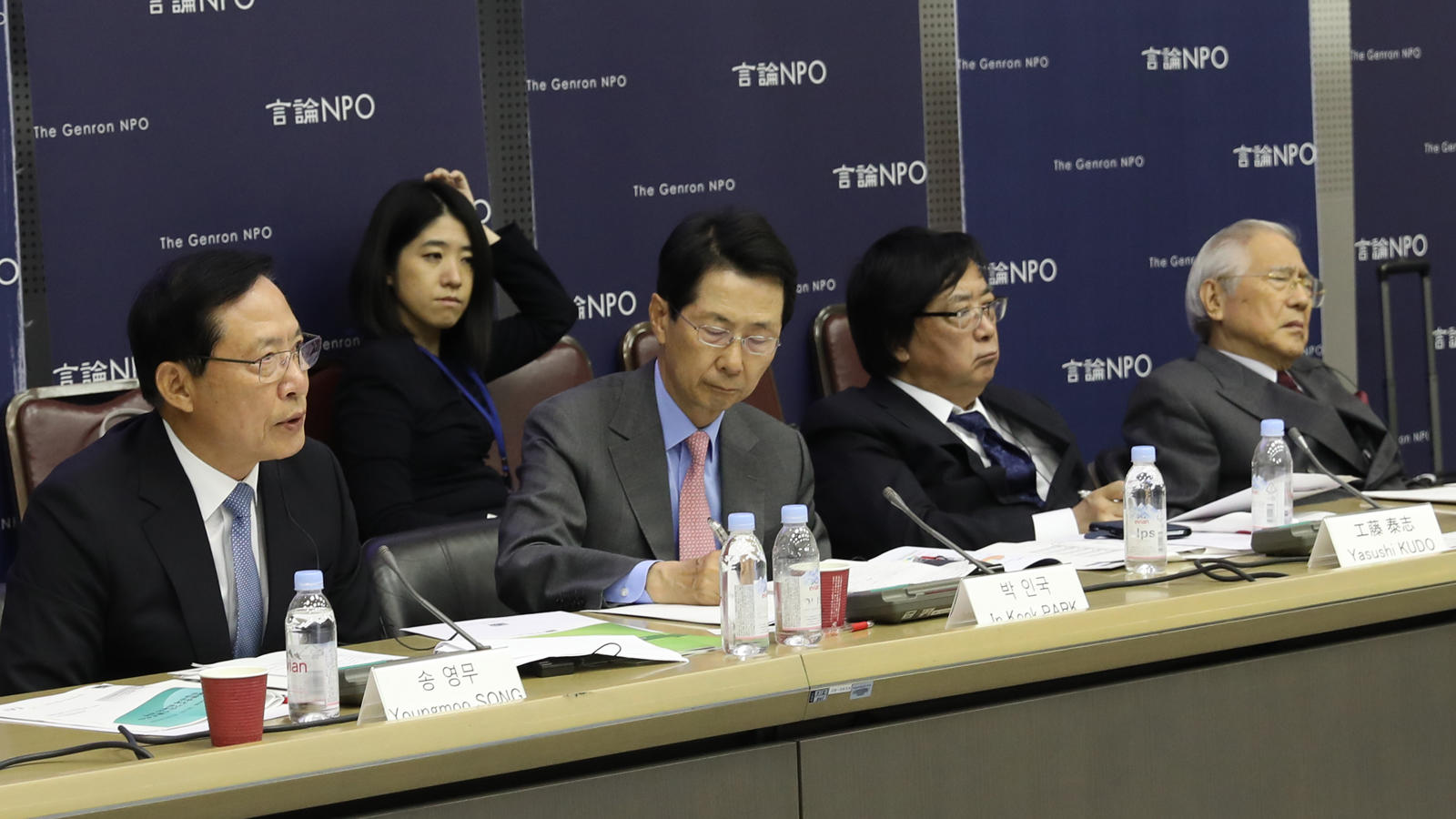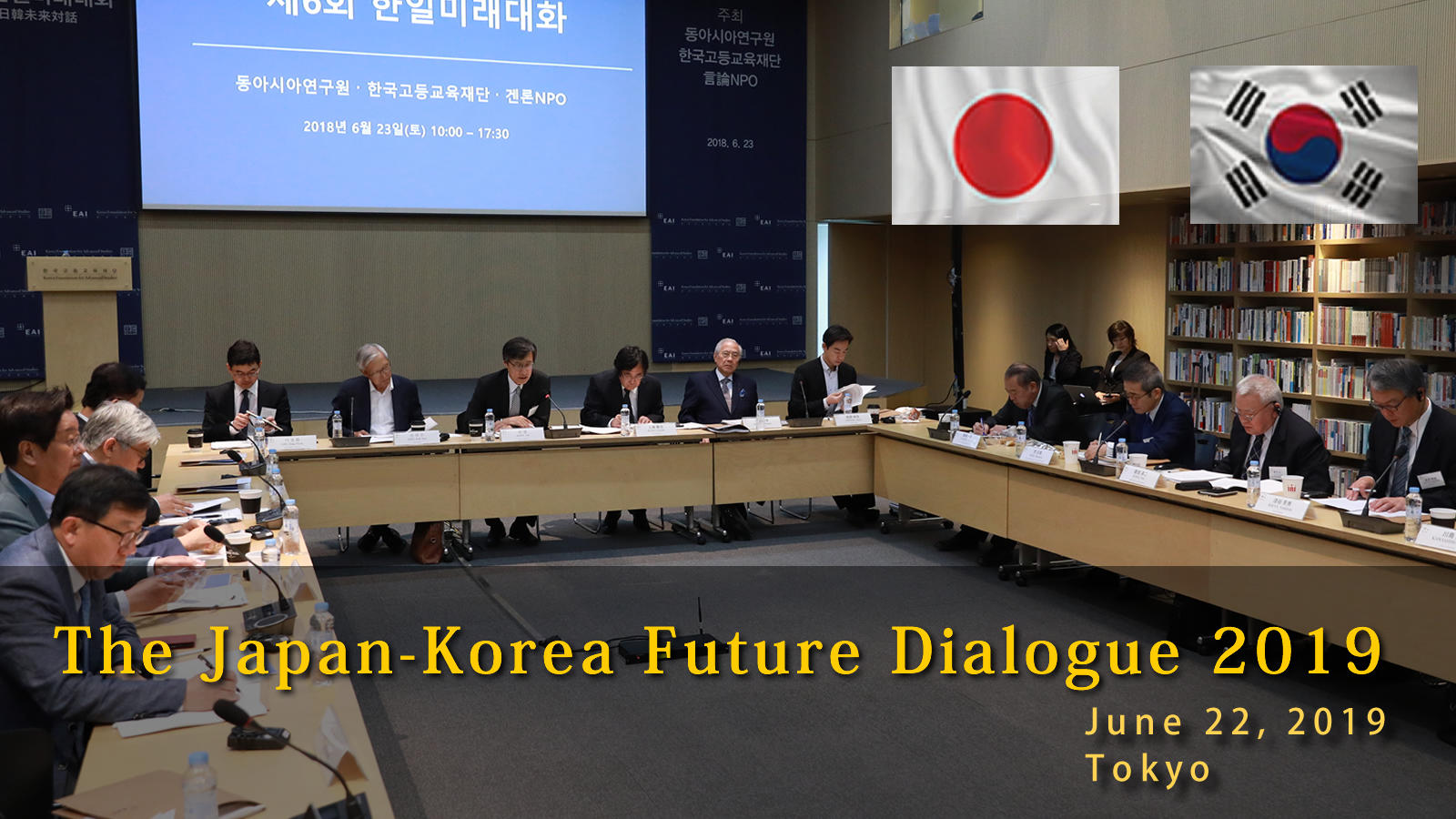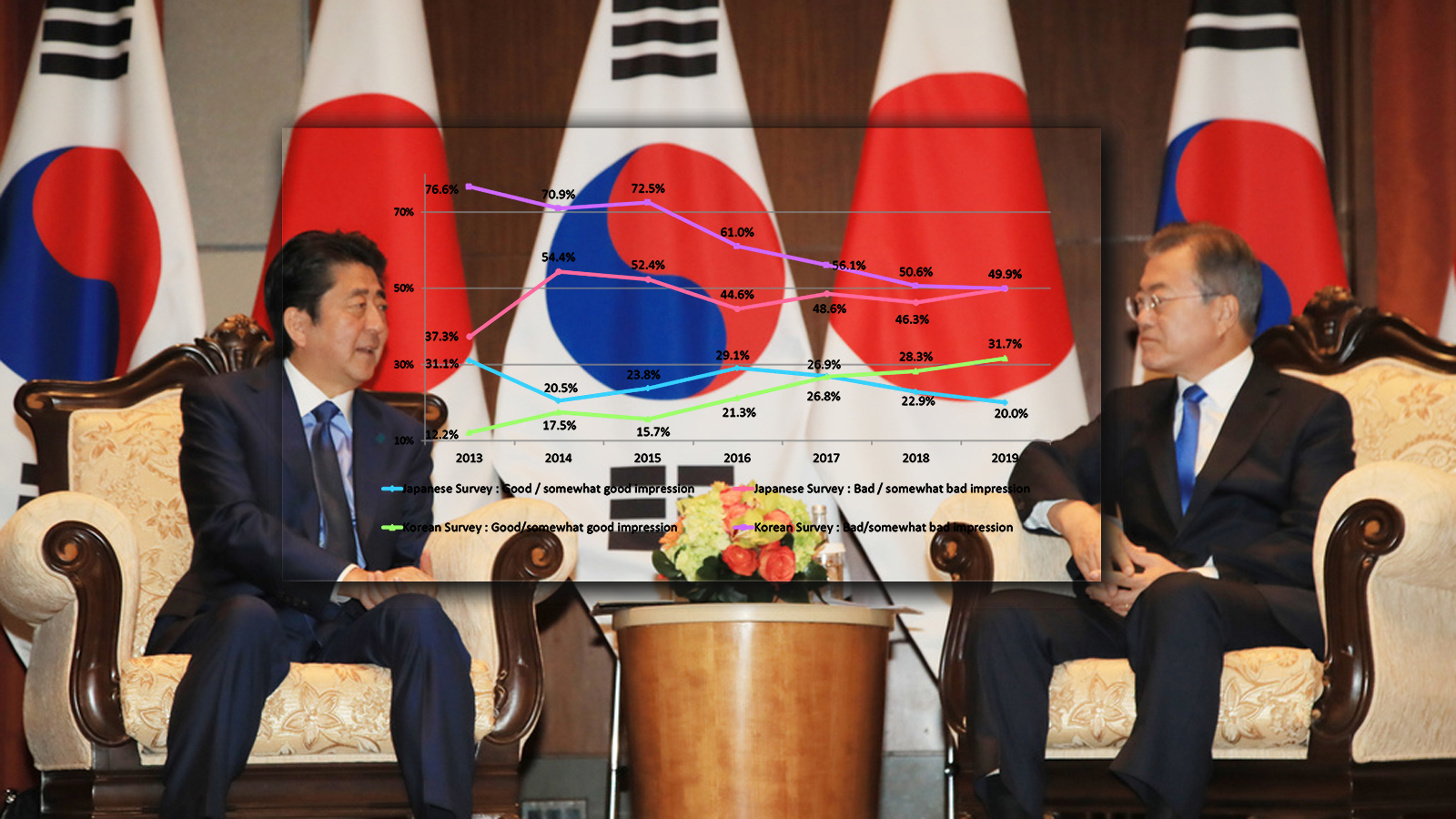Building a new relationship rather than restoring the old
Professor Junya Nishino of the School of Law at Keio University gave an opening statement providing a Japanese perspective of the session's theme. He described how the relationship between the two countries has changed drastically over the last 30 years and continues to do so. He broached the idea that, rather than attempting to restore the relationship as it was, "Perhaps we should be thinking about how to build a new relationship."
Nishino described Japan-South Korea relations as being centered in three areas - politics, business, and economy - with economy being the primary motive force driving the relationship between the two countries. However, two new aspects to the relationship appeared in the 2000s, namely security and civil society, and civil society in particular has had an increasingly powerful presence.
Nishino mentioned that the results of joint public opinion poll show there is no major difference at the public opinion level, therefore ongoing diplomatic and political frictions could be neutralized by harnessing public opinion. He argued that short-term factors can be managed if political leaders in both countries clearly show their people how important the Japan-South Korea relationship is, and asserted that the relationship cannot be allowed to collapse.
Structural factors remain more difficult to resolve, Nishino said, so the only way to do so is to promote positive aspects such as the abundant private interaction and cultural exchange, and to minimize negative aspects.
The time for strategic dialogue aimed at building a better future
Chaesung Chun, Director of Center for National Security Studies at the East Asia Institute and professor at Seoul University asked the panel to consider the strategic direction of the Japan-South Korea relationship.
Chun described how the environment around the countries has been transformed by the US "America First" policy and the deterioration of the US-China relationship. He argued that the only way through the situation is for Japan and Korea to cooperate, but pointed out that the reason they continue to get wrapped up in controversy surrounding historical and other issues is that, "There has been no strategic dialogue aimed at building a better future."
"If Japan and South Korea want to continue to enjoy the benefits of the free order built more than 70 years ago, it is now time for them to cooperate and take strategic action," Chun said, and called for dialogue to achieve that end.
Regarding North Korea, Chun expressed the view that even with the nuclear issue provisionally resolved, confusion and opposition will continue due to the intersection of geopolitical interests of the great powers of the US, China, and Russia. It is necessary for the two countries to cooperate in handling these issues, he explained, again emphasizing the importance of strategic dialogue.
The conscripted worker lawsuit rulings
With the opening statements complete, panelists plunged into a discussion about the rulings made in the lawsuits filed in South Korea regarding the issue of Japan's conscription of workers during Korean occupation.

Gen Nakatani, a member of Japan's House of Representatives, stated his belief that the current framework must not be discarded. The treaty signed 54 years to the day before the public forum included provisions on claim rights and economic cooperation, he reminded the panel, and it has served as the foundation of the Japan-Korea relationship ever since. Moreover, he added, the South Korean government confirmed its responsibility for providing compensation ten years ago. If this framework is to be discarded, Nakatani argued, the only option is to invoke Article 3 of the treaty, which states that if a conflict cannot be resolved through diplomatic means, it must be left up to decision by arbitration. Therefore, Nakatani concluded, judgment in this matter should entrusted to the hands of the International Court of Justice.
In response, Chosun Ilbo Tokyo Bureau Chief Hawon Lee agreed on the facts of the matter, i.e. that the claims issue had been resolved in 1965. However, he added, "Does it not still seem as if the corporate response has been somewhat lacking? Finding a legal resolution does not bring the issue to an end; measures must be found to relieve the emotional issues that remain."
Lee noted that if Japan were to accept the settlement proposal announced by the Korean Ministry of Foreign Affairs on June 19, through which a foundation would be established to provide compensation funded by Japanese and Korean corporate defendants, it would be in accordance with the original agreement. Lee expressed his hope that Japanese companies would voluntarily fund the foundation. He also offered a new idea for cases for which providing compensation to actual conscripted workers was difficult. A foundation could be built for children and a breakthrough could be reached in that way as they will be the ones responsible for the future relationship between the two countries.
Rui Matsukawa, a member of Japan's House of Councillors of Japan, stated that the 1965 system serves as the foundation of the intergovernmental relationship, and if there is a desire to change it, "Both countries must be involved. It can't be resolved only through the work of actors in civil society."
She also emphasized that a fundamental premise of this must be the handling of the claims issue by the Korean government, even in the case of Lee's new idea. Matsukawa also admitted that civil actors do not know enough about the claims rights negotiation process, and that "the government must provide a clear explanation."

Noh Woong Rae is a member of the South Korean National Assembly and member of the ruling Democratic Party. He was pessimistic about the possibility of finding a resolution to the issue through the international courts, as establishing an arbitration committee as desired by the Japanese requires the cooperation of the Korean government and the Moon administration will "never allow it." He called on Japan to, "offer its own wisdom if this is truly an issue that cannot be resolved by Korea alone.
Following this series of exchanges, Koji Matsubara, a newscaster with the BS-TBS program Hodo 1930, lamented the fact that discussion about the conscripted worker issue never results in any sort of agreement being reached.
"Personally speaking, I don't feel that I have to follow an arrangement made between two governments, no matter what it might entail," he said, and expressed a certain understanding regarding the new proposal made by Hawon Lee.
Matsukawa responded by explaining some of the frustration felt by the Japanese government regarding the situation.
"If President Moon would just engage with us and suggest something, maybe we could come up with something new, but there's nothing we can do if he doesn't even try."
Former South Korean Ambassador to Japan Kak Soo Shin answered Matsukawa, asking for a level of understanding as government actions are, by their very nature, constrained by law. While he admitted that a response has been slow, the settlement proposal of June 19 shows that "while it may be slow, the Korean government is also moving on this issue."
Sohn added, "Perhaps the Japanese government is asking for too urgent a response. The settlement proposal is simply a first step towards resolving the issue."
Associate Professor Hideki Okuzono of the University of Shizuoka's Graduate School of International Relations believes that "the Japanese government will never accept the proposal," as although there are similar lawsuits regarding numerous disputes ongoing, they are not covered by the proposal. Okuzono suggested that President Moon's history as both a former civic activist and lawyer would suggest a tendency to demand that 100% of victim claims be accepted, but no progress will be made if he cannot find a way of putting aside that way of thinking to reach a compromise.

Keio University School of Law professor Yoshihide Soeya stated that while the Korean government hasn't denied the current framework, it has stepped outside it regarding the individual right to claim. He described the Japanese response as, "Not a demand for Korea to intervene legally, but to fulfill their role as government."
Shared strategic interests and the necessity for dialogue
As Chaesung Chun pointed out in his opening, Kak Soo Shin noted that "the two countries share strategic issues," and that the lack of dialogue regarding those issues is part of the problem. He added that there is a misunderstanding among the Japanese that Korea is leaning towards China and that President Moon is pro-North Korea. However, the lack of discussion is the reason for that misunderstanding, and he called for a quick resumption of dialogue between the countries.
Yonsei University professor Ki Jung Kim made a point about shared strategy.
"There is no need to take exactly the same position, but there should be an attempt to agree on the basics," Kim said. "Also, we must be able to maintain stability even when our respective governments change."
Kim proposed that peace on the Korean peninsula should be one part of that shared strategy, saying, "Japan will also greatly benefit from such a peace, and I hope that it will work with Korea towards achieving that."
Professor Yasuyo Sakata of the Kanda University of International Studies lamented the fact that none of the various proposals to improve the Japan-South Korea have been fully utilized by either government. Considering that, he asked the Korean panelists whether a new shared strategy is even possible, noting the major changes in the strategic environment that have arisen due to the conflict between the US and China conflict.
Young Sun Ha is Chairman of the Board of Trustees at the East Asia Institute, and he pointed out that too many people in power in both countries attempt to use the strained relationship to benefit themselves domestically. He believes the issue needs to be decoupled from politics. He warned the panel that, "Both the US and China are producing strategies for 50, even 100 years into the future. If Japan and South Korea don't also engage in strategic dialogue with an eye on the future, we will regret it within the decade."
Se Yeon Kim, a National Assembly Member with the Liberty Korea Party, stated that deeper dialogue is necessary to achieve true mutual understanding, but as the level of that dialogue rises to summit and ministerial level talks, the difficulty increases. Accordingly, Kim argued that more multitiered dialogue should be created through increased talks at lower governmental and business levels, and through an increase in talks between younger individuals such as students and people in their twenties and thirties.

In response to Kim, Kazuo Ogura, Councillor at the Japan Foundation and former Ambassador to the Republic of Korea, said, "While the younger generation will build the future, only those who know the past, the older generation, are truly able to discuss the future." With this, Chun and Nishino were asked to provide commentary summarizing the discussions.
Formulating a shared strategy is an urgent issue for both countries
Chaesung Chun mentioned South Korea's participation in the Indo-Pacific Strategy and the need for the two countries to study how to deal with China, urging Japan and South Korea to obtain a shared awareness of the situations they face as soon as possible.
Regarding the day's dialogue, Chun pointed out that the discussion often degraded into government talking points, and reminded the panel that, "Citizens in democracies are allowed to make different arguments than their governments do. We need to be engaging in practical discussions from freer points of view."
Nishino made the point that while the lawsuits regarding conscripted workers have caused some instability in the "1965 framework," he pointed out that the Japan-South Korea relationship is built upon a numerous similar efforts, including the Japan-Republic of Korea Joint Declaration of 1998. Nishino argued that the overall flow of the relationship must be carefully taken care of. Nishino also mentioned that he hopes the Future Dialogue will continue to be held into the future.
After the comments by Chun and Nishino, Sohn and Kudo offered their own concluding remarks as moderators, and Kudo wrapped up Session 2 with a closing statement.

A fresh start for the Japan-Korea Future Dialogue
In closing, Kudo called for more discussion in both countries, both to earn the support of the citizenry and to promote concrete collaboration, not simply exchange. He reminded those gathered that this year's Japan-Korea Future Dialogue was in danger of being cancelled with the loss of government and corporate funding. For Kudo, the fact that it was realized through citizen contributions means that the forum has made a fresh start, as a "true dialogue between citizens." He expressed his determination to continue Genron's efforts and concluded The 7th Japan-Korea Future Dialogue.






Post a comment